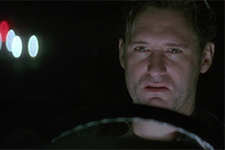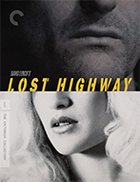Lost Highway (4K UHD) [Blu-Ray]
|

In a lengthy interview with Esquire from the set of Scarface (1983), director Brian De Palma infamously threatened to make his next project "a hard-core pornographic suspense film" (the resulting film, 1984's Body Double, was certainly salacious and controversial, but not the hard-core porn he threatened). Exhausted from the numerous battles with the MPAA over the levels of sex and violence in his films, he was clearly in a mood to simply go for broke, damn the torpedoes: "So, if they want an X, they'll get a real X!" I imagine that David Lynch was in a similar place when he made Lost Highway. His first feature-length in five years, he was still smarting from the critical and commercial drubbing that his previous film, Twin Peaks: Fire Walk With Me (1992), had taken. Prior to that, he was at the height of his creative and popular success, having walked off with the coveted Palm d'Or at the Cannes Film Festival for Wild at Heart (1990) and then inexplicably attained mainstream popularity with his cult television series Twin Peaks (1990-91). Fire Walk With Me failed because it failed to please anyone: it was too arty, dark, despondent, and fractured for the fans of the television series who just wanted to know who killed Laura Palmer and not enough of all of those things for the Lynch fans who prized the surreal weirdness of his feature debut Eraserhead (1977). One can imagine Lynch absorbing all the criticism and deciding, much like De Palma did with Body Double, to just go for broke and give critics and audiences exactly what they had been criticizing him for: Something that absolutely, positively made no sense whatsoever. And that is exactly what he did with Lost Highway. Co-written by Lynch and Wild at Heart novelist Barry Gifford, it starts out as one kind of film, and then inexplicably turns into a totally different one before winding its way to an incoherent ending that doesn't just leave questions unanswered, but simply blasts through the very pretense of even asking them. Lost Highway is a film of images, attitudes, tones, and homage that is free to move about in whatever direction Lynch desires because there is no reigning significance or structure. It is like a dream, but not one with its own internal logic like Eraserhead or Blue Velvet (1986). Rather, it feels more like Lynch saying, "You want weird? Well, here's something really weird." How you respond to the film will likely hinge entirely on your willingness to go along for the ride with no real expectations, and I can't help but think that Lynch was catering to and desiring negative responses (the film's ad campaign made prominent use of bad critical responses). However you feel about it as a whole, there is no arguing that Lost Highway doesn't start out exceptionally well. The first third of the film, which is all neo-noir moodiness and fatalism, involves a jazz musician named Fred Madison (Bill Pullman) who lives in a modernist L.A. abode with his sullen, raven-haired wife, Renee (Patricia Arquette). They begin receiving unmarked packages on their front steps that contain videotapes, each of which features what appears to be surveillance footage of their house. However, the footage on each tape moves closer and closer into their private space, so that, while the first one is just of the house's exterior, the last one contains footage of them sleeping in their bedroom. This exceedingly creepy scenario is all the more unnerving because of the mannered way in which Lynch frames the drama, with Pullman and Arquette acting as if they are in a languid dream. This section of the film also includes what is undeniably one of the greatest, eeriest sequences in Lynch's entire oeuvre, where Fred is at a tony party in the Hollywood hills and meets a strange, pale-faced man with leering eyes and a devious grin (Robert Blake) that he had briefly seen earlier in a nightmare. The man insists that they have met before and that it was at Fred's house, and when Fred protests, the man hands him a phone and tells him to call his house. When he does, he hears the man's voice on the other end saying, "I told you I was here." It is a simple scene, but a profoundly unnerving one that ranks among Lynch's best moments. This section of Lost Highway concludes with Fred apparently murdering and dismembering Renee (we only see horrific flash cuts), after which he is quickly (off-screen) tried and sentenced. But, while he is in prison, Fred ceases to be himself and instead becomes Pete Dayton (Balthazar Getty), a 24-year-old auto mechanic. Pete has no recollection of how he got in the cell, and since the police don't know either, they let him go. He becomes involved with a vicious mob boss named Mr. Eddy (Robert Loggia) and his platinum-haired girlfriend, Alice Wakefield (played again by Patricia Arquette). Like Jeffrey Beaumont in Blue Velvet, Pete finds himself torn between two women: a seeming "good girl" named Sheila (Natasha Gregson Wagner) and Alice, the "dangerous" femme fatale, who tries to convince him to steal money from Mr. Eddy, which puts them both at mortal risk. Of course, given that Lynch has already demonstrated his willingness to subvert anything resembling logic or coherence, it is anyone's guess where the film is headed and where it might eventually land. Described by Lynch as a "psychogenic fugue" that is in some way about the nature of identity but is ultimately open to all manner of interpretation, Lost Highway is a film of isolated moments of brilliance mired in a long, meandering swamp of incoherence. It is as if Lynch and Gifford had a bag of great ideas, but no idea how to string them into a true narrative, so instead they opted to simply scatter them and fill in the blanks with whatever they could find. Lynch plumbs the darkness and comes up with some generally unsettling images and ideas, but they don't really stick because they aren't connected to anything larger than themselves. For every scene like the mystery man at the party or the bizarro hilarity of Mr. Eddy accosting and beating a tailgater in broad daylight on Mulholland Drive, there are long stretches of dramatically inert exchanges that don't really go anywhere. It doesn't help that Balthazar Getty makes for a relatively bland protagonist to anchor the film's second half and Arquette seems ill at ease in the role of vixen. Lynch certainly encourages us to go digging for significance, and the film all but demands multiple viewings to piece it all together, which is ultimately an exercise in futility.
Copyright © 2022 James Kendrick Thoughts? E-mail James Kendrick All images copyright © The Criterion Collection | |||||||||||||||||||||||||||||
Overall Rating:



 (3.5)
(3.5)
Subscribe and Follow
Get a daily dose of Africa Leader news through our daily email, its complimentary and keeps you fully up to date with world and business news as well.
News RELEASES
Publish news of your business, community or sports group, personnel appointments, major event and more by submitting a news release to Africa Leader.
More Information
